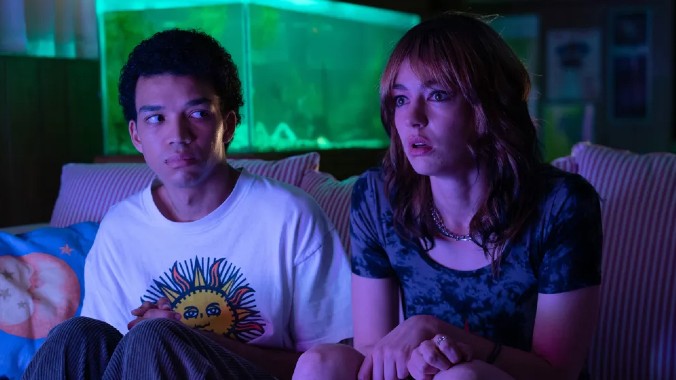Director of ‘I Saw The TV Glow’ Wants to Make Things With a ‘Lingering Power’
Jane Schoenbrun's second film is a deeply personal, hypnotic tapestry of contemplations about transformation, personal coping mechanisms, and the horrors of real life.
Photo: VVS Films EntertainmentMovies
If you grew up during the era when appointment television was still a thing, and your life revolved around passionately watching a new episode of “your show” every week, then writer/director Jane Schoenbrun’s made a movie just for you.
I Saw the TV Glow is Schoenbrun’s follow-up to their haunting 2021 Sundance release We’re All Going to the World’s Fair. Glow follows the friendship of social misfits Maddy (Brigette Lundy-Paine) and Owen (Justice Smith). Maddy’s the slightly older, intriguing loner that Owen gravitates towards because she’s obsessed with the show, The Pink Opaque. As a sheltered kid, he’s fascinated by the supernatural Saturday night drama but isn’t allowed to watch it. Then he bonds with Maddy at school where she slips him VHS tapes of the show, which inevitably changes both of their lives.
Glow is a frighteningly accurate representation of teenage loneliness as told through an existential fever dream. Throughout, Schoenbrun gently nudges us to consider when our human proclivity to escape into fictional worlds becomes less of a balm and more of an enabler of arrested development. At the same time, and more importantly, it’s a rumination on the struggles of self-acceptance. As a trans filmmaker, Glow is Schoenbrun’s deeply personal, hypnotic tapestry of contemplations about transformation, personal coping mechanisms, and the horrors of real life.
As a millennial who grew up in the pop culture heyday of ‘90s television made for teens, Schoenbrun got to soak up in real time some of the best examples of the era, from The WB’s Buffy the Vampire Slayer, and Nickelodeon’s Saturday night programming (or SNICK) which included shows like Are You Afraid of the Dark? and The Adventures of Pete and Pete. It’s partially through these shows that Schoenbrun found their own voice, eventually leading to their gender transition a few years ago. Through Owen and Maddy, Glow delivers a metaphorical reconciling of the paths taken in life.
On a recent Zoom, Schoenbrun went down the inspirational media rabbit hole with me to discuss David Lynch, the compassionate message that runs through Glow, and the transformational power of Buffy the Vampire Slayer. This interview has been edited and condensed for clarity.
JEZEBEL: As a child of the ‘90s, how did you watch your favorite shows? Did you have a little tribe? Or did you watch by yourself?
JANE SCHOENBRUN: I had a friend when I was really young who lived next door. Our backyards touched so I could walk through my backyard to his backyard and then into his basement. We watched a lot of The Simpsons. But I think for the most part, it was a pretty solitary pursuit for me. SNICK on Saturday nights was a very holy experience. I’m sure I had sleepovers where I was watching it with friends. But that didn’t even matter. I wasn’t in it for the friends. Saturday night was something I looked forward to all week. And then from 8 p.m. until 10 p.m., it was just like, I’m in my happy place.
I think with Buffy, especially, that was very much a solitary pursuit. I was ashamed of my love of Buffy in my real life, like the thing in my film where the dad says, “Isn’t that a show for girls?” I didn’t want to be ripped on for my love of Buffy. It’s not like I thought Buffy was lame, you know. I was like, “This show is great. You guys don’t get it.” But I definitely knew enough to not be showing up to school as a, quote-unquote, “12-year-old boy” in a Buffy t-shirt. But I did show up to school as a 12-year-old, quote-unquote, “boy” in a Twin Peaks Fire Walk With Me t-shirt that I got from Generation Records in Lower Manhattan and I was bullied ferociously. And now the history books are on my side.
-

-

-

-

-

-

-

-

-

-

-

-

-

-

-

-

-

-

-

-

-

-

-

-

-

-

-

-

-

-

-

-

-

-

-

-

-

-

-

-








































